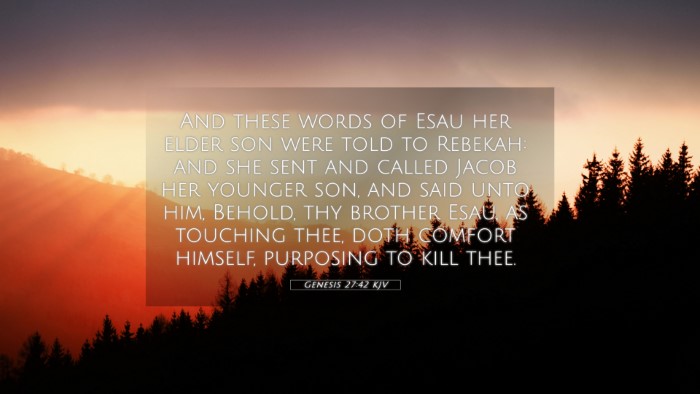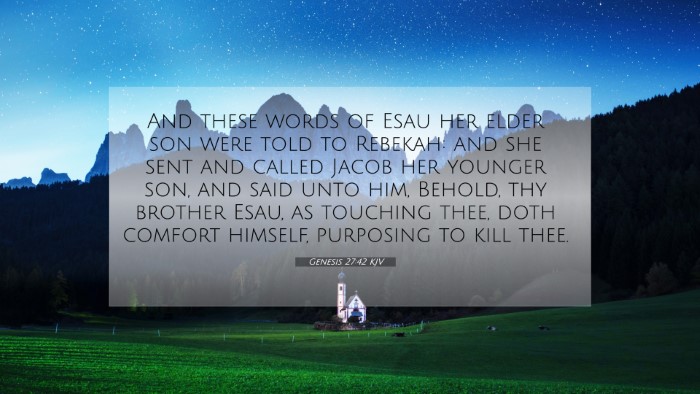Understanding Genesis 27:42
Genesis 27:42 states: "And these words of Esau her elder son were told to Rebekah: and she sent and called Jacob her younger son, and said unto him, Behold, thy brother Esau, as touching thee, doth comfort himself, purposing to kill thee."
This verse captures the tense dynamics within the family of Isaac and Rebekah, focusing on the conflict between the brothers Esau and Jacob.
Summary of Insights from Public Domain Commentaries
Matthew Henry's Commentary
Henry highlights the significance of family secrets and the tragic consequences of favoritism. Rebekah's eavesdropping reveals not only Esau's anger but also the familial strife that results from Jacob's deception. Henry notes that in the quest for blessing, Jacob and Rebekah forsake moral integrity, leading to deep familial divisions. The mention of Esau's intent to kill Jacob underscores the gravity of envy and resentment. This intent brings forth the necessity for Jacob to flee, signifying the fallout from their actions.
Albert Barnes' Notes on the Bible
Barnes explains that Esau's plot for revenge drives the narrative forward. His words convey a temporary comfort, masking a profound bitterness that eventually culminates in threats of violence. This reveals the human condition's vulnerability to jealousy and wrath, emphasizing how quickly relationships can deteriorate due to envy. Barnes also draws attention to Rebekah's proactive response, highlighting her protective instincts towards Jacob as a critical moment in the family's drama.
Adam Clarke's Commentary
Clarke underscores the tension within the household, focusing on Rebekah's strategy to shield Jacob from Esau's wrath. The emotional weight of Esau's words foreshadows the chaos and grief that will envelop the family. Clarke notes that this event is a pivotal moment that shapes the future of the Israelite nation, as rivalries are established not just between brothers but also between nations descended from them. He stresses the consequences of favoritism within families, providing a moral lesson on the dangers of deception and familial division.
Key Themes in Genesis 27:42
The thematic elements prevalent in Genesis 27:42 revolve around:
- Favoritism: The parental bias towards Jacob creates a rift between the brothers.
- Deception: Jacob's earlier deceit leads to dire consequences, provoking Esau's vengeful thoughts.
- Conflict: This familial discord highlights the broader theme of conflict in relationships, both personal and spiritual.
- Protection: Rebekah's efforts to protect Jacob underline the maternal instinct to preserve family ties.
- Revenge: Esau’s intended revenge illustrates the destructive nature of unresolved anger and betrayal.
Bible Cross References
To deepen the understanding of Genesis 27:42, one can explore several cross-referenced Bible verses:
- Genesis 25:29-34 - The initial selling of Esau's birthright.
- Genesis 27:36-41 - Esau's reaction to Jacob's deceit.
- James 3:16 - The connection between envy and chaos.
- Hebrews 12:16-17 - A warning against the root of bitterness exemplified by Esau.
- Genesis 31:1-3 - Jacob fleeing from Esau's intended wrath.
- 1 Peter 5:8 - A reminder of the enemy’s intent to destroy.
- Matthew 10:36 - The divisive nature of familial strife in the pursuit of truth.
The Importance of Cross-Referencing Biblical Texts
Engaging in comparative Bible verse analysis allows believers to uncover profound insights and connections within Scripture. Understanding the complexities of relationships illustrated in Genesis 27:42 can be enriched through linking Bible scriptures that deal with themes of conflict and resolution. These connections provide a richer narrative and help illustrate the consequences of human actions and emotions, making it an essential practice for personal Bible study.
Tools for Bible Cross-Referencing
For those interested in exploring these themes further, various Bible cross-reference guides can aid in locating passages that resonate with the narratives of Genesis. Familiarity with a Bible concordance can assist users in finding related scriptures, enhancing their understanding of the interconnectedness of biblical texts.
Conclusion
Genesis 27:42 serves as a crucial reminder of how familial relationships can be tested by choices fueled by ambition and fear. The insights from Matthew Henry, Albert Barnes, and Adam Clarke collectively encourage a study of the text that reveals the intricacies of human relations and divine providence. Through diligent cross-referencing Biblical texts, readers can discover the underlying messages within the Bible that continue to be relevant in today's context. Embracing these thematic Bible verse connections fosters a deeper spiritual journey and understanding of God's word.









